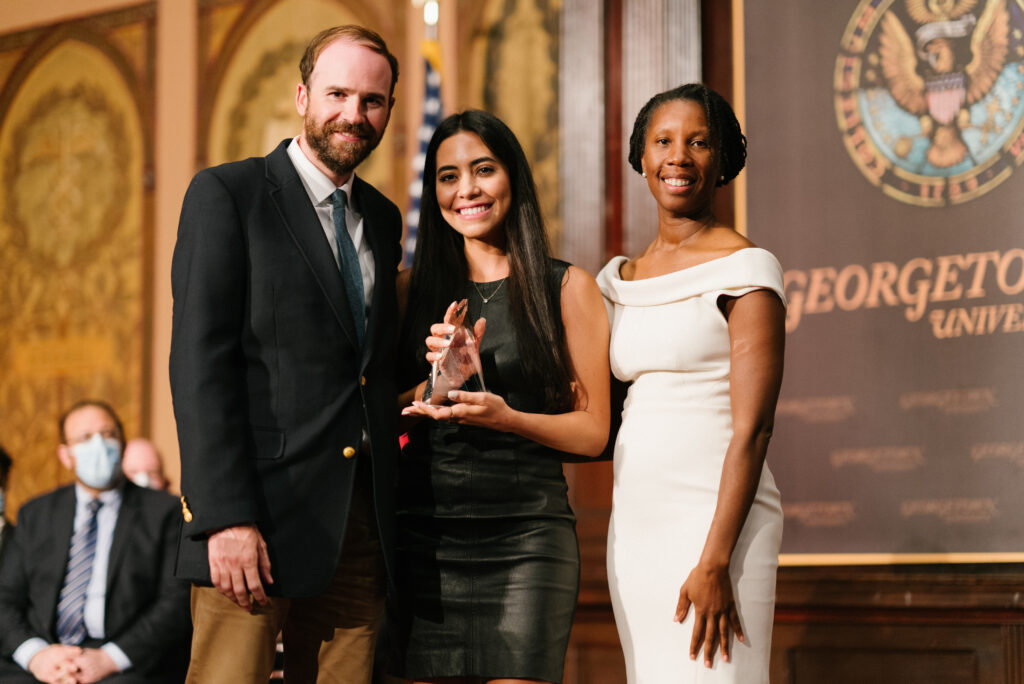Last week, Georgetown SCS celebrated the Class of 2022 with multiple ceremonies. The annual Tropaia awards took place in Gaston Hall on May 18 and the traditional Commencement exercises occurred on Healy Lawn on May 20. This was the first time since 2019 that both of these formal proceedings were realized in-person.
The collective joy and relief of returning to one another, a theme first picked in Mission in Motion at the Mass of the Holy Spring that began the 2021–2022 Academic Year, were palpably present during these events. And while the SCS community continues to adapt to the changing conditions brought about by the COVID-19 pandemic, this year’s Commencement sets into motion a renewed way of proceeding at Georgetown.
There were many insights, ideas, experiences, and notable occurrences to highlight during the week of Commencement. Tropaia featured award-winning students and faculty members across the School’s degree programs, including this year’s SCS Spirit of Georgetown award winner Lorena Chinos (see Lorena’s Mission in Motion interview here). Faculty directors noted the adversity and challenge that these community members overcame in realizing their academic goals while serving their communities. The theme of service and commitment to others was also loudly expressed during the Commencement ceremony.
Shaun Harper, Ph.D., a globally recognized diversity, equity, and inclusion (DEI) thought leader and practitioner, inspired the assembly of those gathered in person and online by noting the collective resilience displayed by the Class of 2022. But more than offering platitudes and empty encouragements, Dr. Harper challenged the graduates and everyone assembled to continue the work of justice, service, and compassion for one another. Dr. Harper offered an insightful take on the double meanings of continuation and discontinuation. (In case you missed it, his remarks begin at the 1:15:25 mark.) On one hand, he encouraged graduates to continue their habits of study and life-long learning and deep service of their families, friends, community, and society. In this way, graduation is not an end but a continuation.

But on the other hand, Dr. Harper presented a considerable challenge. Moving ahead in one’s profession and life, formed by a Georgetown SCS education, means standing up for principles and values and working individually and collectively to discontinue those practices and policies that separate and divide our communities. He pushed the graduates to realize more completely a just and inclusive society, one that begins in the home but then extends to every sector of the society. And while there continue to be reasons for discouragement and desolation about the world’s state of affairs, Dr. Harper ultimately delivered a hopeful message: There is hope, he maintained, in the continuation.
Georgetown President John DeGioia also picked up on this theme of hope in his concluding remarks. He referenced the concept of “sentire,” or felt knowledge, which President DeGioia presented during his Sacred Lecture as part of Georgetown’s celebration of the Ignatian Year. Rooting his remarks in the Ignatian and Jesuit spiritual tradition, President DeGioia expressed the hopeful possibilities that result from being educated at Georgetown. Knowledge itself and the continual pursuit of it can spark new discovery, new possibilities, and new solutions to the challenges that we face.
We all have a shared stake at Georgetown, whether as current students, staff, faculty, or alumni, in working together to realize a more just future. My hope is that this week of celebration serves as a continuing reminder of the deeper purpose of our educational tasks at the University and a resource for continuing to navigate the disruptions that challenge us.
